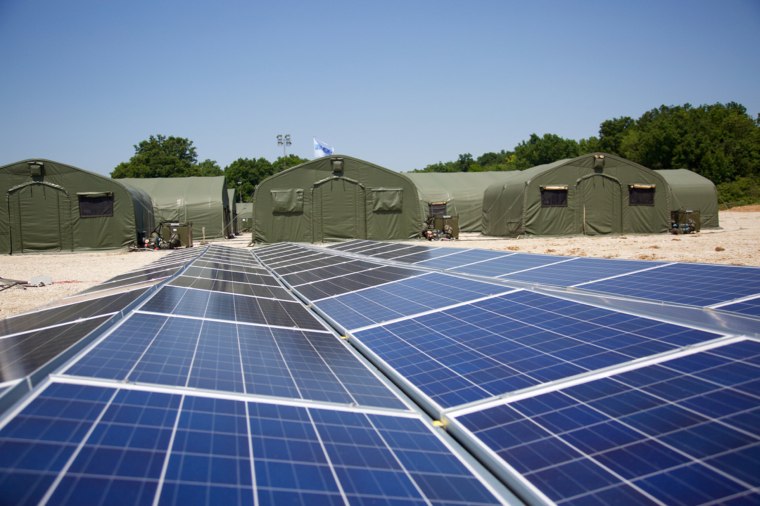THE HAGUE, Netherlands — Highly efficient air conditioners, LED lights and power meters will be used alongside weapons of war at an upcoming NATO exercise.
Military officials from 29 countries — including the United States — will test whether energy efficient equipment and hybrid diesel-solar power systems can be easily integrated into their operations in Poland this June.
The increased focus on energy efficiency and reduced fuel consumption is indicative of a wider shift in how militaries are trying to adapt to environments reshaped by climate change and intensifying natural disasters.
The alliance recognizes climate change could affect its security, planning and operations, NATO's Environment and Smart Energy Officer Susanne Michaelis told NBC News in a statement.
“NATO’s focus is not predominantly on the environmental impact of military activities, but rather on a more efficient use of energy. Put differently, it is about military effectiveness,” she said, adding that the result of “a smaller environmental footprint, is a ‘win-win’ outcome.”
Lightweight equipment that can be powered by renewables rather than fuels that need to be imported are better for responding to natural disasters such as floods and wildfires, Michaelis said. NATO provided support when Sweden faced historic wildfires last summer.
The war games will come amid a global movement — from school strikes and protests to debates in Congress over the proposed Green New Deal — that is placing response to climate change at the center of the political agenda.
Experts warn that climate change is poised to not only cause more extreme weather events but also spark conflicts from the Arctic, where disappearing ice is sparking a geopolitical race for dominance, to Africa's Sahel region which is grappling with increased water scarcity and extremist groups. These conditions also drive migration, already being seen in Central America.
“I’d like to see us begin to get ahead of the climate curve,” Sherri Goodman, a former U.S. deputy undersecretary of defense, said.
Goodman serves as secretary general of newly established International Military Council on Climate and Security, which is based at the Center for Climate and Security in Washington.
The council, which was announced in February in The Hague, aims to bring the impact of climate change on natural disasters and conflicts to the forefront of military strategy.
Armed forces help launch humanitarian relief after a disaster, yet those operations don’t get the same level of foresight applied to other threats such as nuclear war or terrorism, Goodman said.
“Militaries are great planning organizations, we need to utilize that great planning capability to get further ahead of the climate threat than we have,” she said.
The connection between climate change and national security is no secret. A federal report on the impact of climate change released in November found that it would have “direct impacts on U.S. military infrastructure and by affecting factors, including food and water availability, that can exacerbate conflict outside U.S. borders.”
A more recent report the Department of Defense released in January highlighted numerous Air Force, Army and Navy infrastructure currently at risk of damage due to flooding, drought, desertification and wildfires.
These conflicts are already taking shape. Gen. Tom Middendorp, chair of the international military council and a former chief of defense of the Netherlands, said he’s witnessed the issue first hand as a commander in Afghanistan, where despite liberating a village from the Taliban, disputes continued.
“In the end, we beat the enemy but we didn’t solve the problem,” he said. “It took us another year to find out why.”
It turned out water scarcity was driving the conflict, he said, by escalating tensions among the people and giving extremists leverage. The military decided to bring in water management experts to find solutions for the predominately agricultural community, and once the fixes were implemented, the conflict finally ended.
“For the military, it’s very important to understand the root causes of a conflict and not deal with the symptoms alone,” he said. “The more that you can address the [root causes], the less you have to fight over it, and it saves lives.”
Military forces can also reduce the negative impacts they have on communities, often without realizing it. In Mali, Middendorp said United Nations missions digging wells to get water for troops were draining the resource from nearby villages. When it became apparent this was creating animosity with the very people the mission was trying to help, water reuse and purification mechanisms were brought in to reduce the strain on groundwater. “We used defense as a platform for innovation,” Middendorp said.
He added that defense forces have a role to play in considering how their operations use local resources, exacerbating tensions such as sparking a jump in fuel prices in remote locations or putting a strain on water during a drought.
But both Goodman and Middendorp acknowledged that not all militaries are willing to discuss climate change because of the political debate.
At a U.N. Security Council meeting in January, U.S. Ambassador Jonathan Cohen notably didn’t use the words “climate change” in his address despite the issue being the focus of the discussion.
President Donald Trump has repeatedly raised doubts about his belief in climate science. In 2017, he announced the U.S. would withdraw from the landmark Paris climate accord negotiated by former President Barack Obama.
More than 50 military and national security officials wrote to Trump last month denouncing the proposed presidential committee on climate security aimed at disputing the impacts of climate change.
Instead, they urged Trump to trust the warning of scientists that climate change is a threat both to military operations and American lives.
"Let’s drop the politics, and allow our national security and science agencies to do their jobs," the letter said.





